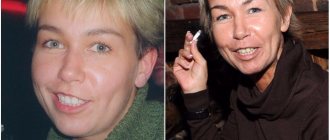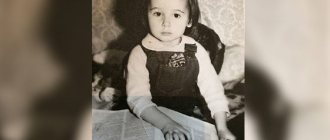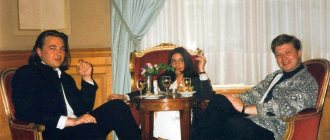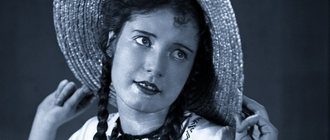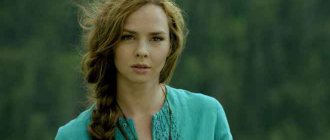» Celebrity life » Veronica Ivashchenko - biography of the TV presenter
0
113
Article rating
| Full name | Veronika Nikolaevna Ivashchenko |
| Date of Birth | November 18, 1990 |
| Zodiac sign | Scorpion |
| Height Weight | 170 cm, 57 kg. |
| Place of study | School of Contemporary Television (at the Faculty of Journalism of Lomonosov Moscow State University) |
| Activity | TV presenter, Mentor at the First Media Academy |
| Marital status | Married, husband - Sergey Vasin |
| Children | No |
| https://www.instagram.com/veronikaivaschenko/ |
Veronika Ivashchenko is a TV presenter working on the Moscow 24 and Spas TV channels. She is considered a real Russian beauty with a kind soul. This fragile girl is admired by many men, and she also has fans among women - she attracts everyone’s attention with her warmth.
Veronica also starred in famous Russian TV series and films: “Ranetki”, “Gloss”, “Dostoevsky”, etc.
Early years, education
Veronica Ivashchenko was born on November 18, 1990. Her small homeland is Rostov-on-Don. As a teenager, she began modeling. When she was 15 years old, she went on a work trip to Japan. In the Land of the Rising Sun, she had to get used to independent life.
According to the girl herself, she didn’t know how to cook back then, so at first she ate mostly bananas. Then she had a neighbor - a fourteen-year-old girl who came from Brazil with her mother. They began to feed Veronica. The business trip lasted several months.
In 2007, Veronica became a student at GITIS. The girl entered the directing department. Its master was the famous theater director and teacher Leonid Kheifets. In 2010, she entered VGIK, and People's Artist of the Russian Federation Alexander Mikhailov acted as the artistic director of the course.
In 2012, Veronica graduated from VGIK. She subsequently received another higher education. This time she studied at Moscow State University. Lomonosov at the Faculty of Journalism.
How did the favorite of the owner of the Kuntsevsky market from the Soros Foundation become the face of Channel One?
Russians are tired of watching TV - tired of the same faces of presenters, talk shows about Ukraine and news about Syria and the United States. Leading sociological services FOM and VTsIOM record a decline in Russians’ interest in existing television content, and even President Putin, speaking at the Valdai Forum, noted that the entire broadcast network is filled with information about Ukraine, which is often interpreted as unprofitable, “which means something is missing in our programs,” concluded the head of Russia. Channel One decided to respond to the presidential criticism and update not only the content, but also change some of the presenters. The only question is who will now become the face of Russian TV and who will lead this selection?
Subject: Compromising evidence
It's no secret that Channel One and Rossiya are long-time rivals. Presenters, shows, TV news, all this is a subject of competition, as is the relationship between the two heads of channels - Konstantin Ernst
and
Oleg Dobrodeev
. True, recently the position of the “first” button has been seriously shaken financially, since, unlike VGTRK, the channel has a much lower level of state support. In addition, in recent years, advertising revenues have decreased significantly, which is dictated both by the movement of viewers to cable channels and Internet TV, and by the decline in business activity in the country. In this regard, the competition between Ernst and Dobrodeev intensified even more, as the prospect of resignation loomed before both. At the same time, everyone believed that if he was able to keep his place, this would guarantee his retention of it for the next five to six years. To strengthen his position, Ernst decided to find new curators - more progressive than those with whom he worked until recently. The new patrons demanded that their protégé reformat the channel, launch a fresh stream, and, in general, restore its shaky positions in television ratings.
To solve the assigned problems, Konstantin Ernst invited the former controversial presenter Kirill Kleimenov
, which viewers remembered not only for its clumsy methods of propaganda, but also for its absolutely fantastic interpretations of the news.
Critic Irina Petrovskaya
, speaking about Kleymenov, even once called him “a singer of a parallel reality.” However, this did not prevent Kleimenov, who actively imitated Ernst in his communication and appearance, from earning the trust of his boss. Returning to the “first” button, Kleimenov began updating the roster, however, apparently, he decided not only to complete the tasks, but also to make money from it along the way.
Kirill Kleimenov
It seems that one of the types of earnings was supposed to be the sale of key positions on the screen - the places of TV presenters, and the absolute diamond, costing the most, was the sale of the place of the “face of Channel One”, the evening news presenter, which was received by a certain Elena Vinnik
.
The former simple Pskov journalist, and then a successful presenter on the NTV channel and, since 2020, on Channel One, owes her career to her “very close friend” - the director of the Kuntsevsky market Sergei Zotov
.
It’s no coincidence that some sites call him a lover? The official husband of the presenter, biotechnologist Andrei Vinnik
, does not seem to be an obstacle to this connection, as he understands that the happiness and peace of the family largely depends on him. Moreover, her connection with the capital’s billionaire is quite old, dating back to 2003, when he warmed up to a simple Pskov girl who came to conquer Moscow and immediately made her a famous TV personality.
On this topic
6404
Channel One announced its refusal to return Friends to the air
As the media learned, the master of the TV quiz show “What? Where?
An important feature in the biography of Elena Vinnik and her “heart friend” is their closeness to the influential American establishment. Elena Vinnik herself is a winner of the Soros Foundation; thanks to the grant she won, she studied at the University of Manchester, where she met the children of influential Anglo-Saxon businessmen and politicians, both in the UK and in the USA. This greatly helped her build her career at a time when Russia was not under Western sanctions, and her benefactor became the owner of multibillion-dollar assets received from the Moscow construction business. Vinnik turned out to be not only a skilled combat friend, but also a good diplomat. The Soros Foundation is a well-known forge of anti-Russian personnel, which helps to transform from a simple journalist into a serious agent of influence. In 2020, the Prosecutor General’s Office declared two organizations financed by Soros, the Open Society Foundation and the Open Society Assistance Foundation, undesirable in the Russian Federation, since both threatened the constitutional order of Russia. For cooperation with these NGOs, Russian citizens face a fine, and in case of repeated violation – from 2 to 6 years in prison. According to 24smi.org, Elena Vinnik went to study in England precisely from the Open Society Foundation.
Elena Vinnik
But a career needs to end on a high, and for this, 40-year-old Elena Vinnik needed to conquer a real peak, which for her became the “face of Channel One.” Of course, it was not easy to get into this position until the position of director of information programs was taken by the enterprising businessman Kirill Kleimenov. According to the Insider agency, Zotov allegedly had to pay an impressive sum to promote his girlfriend from ordinary presenters to the status of close to a real TV star. After all, the whole country watches the evening news, which means that the one sitting in front of the camera speaks to an audience of almost a hundred million. It was most likely not difficult for Kleimenov to convince Ernst that Vinnik would become the new face of the “first” button; after all, she already worked in the company, and her appearance was suitable. The general director lost sight of the fact that someone could make money from the appointment, believing that Kleimenov was doing everything for the benefit of the channel, carrying out the instructions of his boss.
And so it turned out that the main news of the day was reported to the whole country not by anyone, but by the beloved owner of the Kuntsevsky market, a prominent fellow of the Soros Foundation, whose activities, in our opinion, have always been aimed at one thing - weakening Russia. It seems that Elena Vinnik’s entire rapid career is built on amorous affairs, cunning and Western influence. The crowning achievement of her development was the chair of the presenter, and from there she can make her final leap - into power, for example, by being elected to the State Duma or becoming a member of the Government. Although, it would be worthwhile to figure out whether Vinnik herself poses a threat to Russia? After all, I wonder whose interests can be represented by a person whose level of social responsibility the president would not consider high? And is the management of Channel One doing the right thing, not only allowing such tricks with positions, but also interacting with people who have an anti-Russian position? Most likely, the channel will be able to change its image, but instead of a disgusted Ukraine and monotonous talk shows, the “patriot” Kleimenov and his protégé, who discovers connections with the Open Society, will slip something even more harmful to the Russian TV viewer.
Career in modeling, theater and cinema
Ivashchenko has a very attractive appearance. She can be called a real Slavic beauty. Veronica's height is 170 cm, clothing size is 44. As mentioned above, for some time she was actively developing as a model. Among other things, she managed to star in a photo shoot for the popular men's magazine Maxim.
Veronica made her feature film debut in 2007. The first film in her filmography is “Gloss” by Andrei Konchalovsky. The young artist was entrusted with the episodic role of Polina, whose grandfather is disabled, and she herself is being married off.
In 2008, Ivashchenko starred in the horror film “S.S.D.” In this film she appeared in the image of Nastya. In 2010, Veronica appeared in the popular youth series “Ranetki”, which was broadcast on the STS channel. In it, the actress played the role of Dina.
In 2010, the Ukrainian mini-series “The True Story of Scarlet Sails” premiered. The fragile beauty reincarnated as Assol.
It’s interesting that before filming the project, Ivashchenko did not read Green’s famous book. But I watched a Soviet film with Anastasia Vertinskaya.
In the same year, the series “Dostoevsky” was released, directed by Vladimir Khotinenko. Ivashchenko appeared on the screen in the image of Sonechka Marmeladova. Currently, Veronica is not developing an acting career. The latest project with her participation was the series on STS “Belovodye. The Mystery of the Lost Country." It was filmed in 2013-2014, but released only in the summer of 2019.
In 2012, Veronica entered the service at the famous theater. Ermolova, led by the popular actor Oleg Menshikov.
Among the performances with the participation of the artist was “The Snow Maiden”. The production, directed by Alexey Kuzmin-Tarasov, was a modern reimagining of Ostrovsky's famous play. Unfortunately for fans of the actress’s talent, she did not stay in the theater for long.
In 2013, Ivashchenko left the troupe. This ended her theatrical career. For a while or forever - it’s impossible to say for sure.
The management of the TV channel “Culture” has changed
Vesti-Moscow
State holding "All-Russian State Television and Radio Culture", Sergey Shumakov became the editor-in-chief of "Culture" Vesti-Moscow
State holding "All-Russian State Television and Radio Culture". Instead of Tatyana Paukhova, who will now make the international version of “Culture” as deputy general director of VGTRK, the famous producer Sergei Shumakov became the editor-in-chief of “Culture,” Vesti reports.
In fact, Shumakov and Paukhova swapped positions - the former editor-in-chief of Culture replaced him as deputy general director of VGTRK.
— Experts hope that the new editor-in-chief will raise the channel's ratings
—
The channel expects that the new leader will change the situation in the “swamp”
—
Sergei Shumakov, reference
—
Tatyana Paukhova, reference
“There will be no revolutionary changes on the channel, since under the leadership of Tatyana Paukhova the “Culture” channel has occupied its absolutely unique niche on Russian television. This channel is a national treasure,” said the head of VGTRK Oleg Dobrodeev.
“Our goal is to make full-fledged cultural, modern and balanced television - to keep the viewer in this field of intense competition, without giving up any of the achievements,” Shumakov said.
Sergei Shumakov is known as the producer of films and TV series “Idiot”, “Taras Bulba”, “Island”, “We are from the future”, “Liquidation”, “Paper Soldier”, “Lilac Branch”, “Russian Game”, “Vanechka”, “In the First Circle”, as well as many documentary projects.
The VGTRK press service emphasized that on the issue of advertising, which is not available on Kultura, the channel’s position will not change, despite the change in the editor-in-chief.
Experts hope that the new editor-in-chief will raise the channel's ratings
Experts see the reason for the change of editor-in-chief in the low ratings of “Culture”, associated with the absence of problematic and relevant topics in its programs. According to TNS Gallup, the average daily share of the channel in Russia fluctuates around 2%, writes GZT.ru Newspaper.
“This is a diagram of a slow death rate,” one of the well-known media managers joked in a conversation with the publication. The source says that “there have been no on-air events for a long time”, that this channel is “a museum, academic, respectful, and can never disturb anyone.” “The channel cannot live by the current maintenance of the airwaves, it must force debate. The most important criterion for television is when it goes beyond the boundaries of television itself. When they argue about this in transport, at work,” he explained.
Sergei Shumakov himself did not want to clarify what he meant by “modern and balanced” television, referring all questions to the press service. The editor-in-chief of the Cinema Art magazine, Daniil Dondurei, who is on the board of trustees of Culture, believes that the channel “needs more relevant topics and, most importantly, we need to stop experiencing internal fears.” “More avant-garde art, liberated talk shows, constant updates, formats that would be attractive to people under 55 years old” - that’s what he would like to see on “Culture”.
“The television and broader cultural community have been expecting this change for a long time, although Tatyana Olegovna’s contribution to the development and preservation of the country’s intellectual potential is enormous,” Dondurey noted. “What they did with Shvydky, when they organized the “Culture” channel during the Yeltsin era, largely preserved those spiritual potentials that were quickly wasted by other, exclusively commercial Russian channels.”
The editor-in-chief of “The Art of Cinema” said that the candidacy of Sergei Shumakov for the position of editor-in-chief of “Culture” had been discussed in the television community for a long time, although other names were also mentioned.
The channel expects the new leader to change the situation in the “swamp”
For ordinary employees of the Culture channel, the change of editor-in-chief came as a surprise. Although they admit that conversations about this circulated periodically. “In any large organization, these conversations are always present to one degree or another, but no one really pays serious attention to them. There really weren’t any visible prerequisites for this,” Andrei Raikin, who is working on new projects for news broadcasting at Kultura, told the newspaper.
“These rumors have been circulating for as long as the channel has existed, but now everything has calmed down, so this is a huge surprise for me,” said an employee of the Kultura newsroom, who asked not to be named. She is happy about the changes, as she characterizes the situation on the channel as a “swamp” and “complete bureaucracy.”
“I found out what Tatyana Paukhova looks like a year and a half after joining the channel, and half of the people simply don’t know what she looks like. When she passes by, she doesn’t say hello; she seems to exist outside the process. There is a rigid vertical of power - she says something to her deputy, he says something to his deputy, and that’s the only way it gets to us. And all relationships from below are built the same way - we cannot come to high-ranking authorities with a problem, we need to tell our boss, he will tell his boss, then we need to write some letter, make an appointment with Paukhova, and so on,” she says .
According to her, everyone on the channel understands that “Kultura” is “watched by the Soviet intelligentsia” and they hardly touch on current topics. “The system is built in such a way that it is a heavy, uninteresting, inanimate space,” sums up the employee.
Sergey Shumakov, information:
Sergei Shumakov was born in 1951 in Kursk, graduated from the film studies department of VGIK, and has a PhD in art history. In 1990, he was appointed editor-in-chief of the Ostankino film editorial office. In 1991, he became the author and director of the program “Vestniki” (“Author’s Television”). Since 1995, he has been a producer of artistic, entertainment and educational programs on the ORT TV channel. In 2001–2003, he was deputy general director and chief producer of NTV. Since 2003 – Deputy General Director of the Rossiya TV channel.
Tatyana Paukhova, information:
Tatyana Olegovna Paukhova was born in the city of Kislovodsk, Stavropol Territory, on May 28, 1948.
Television personnel worker since 1968. After completing courses for creative television workers, Paukhova was accepted into the Main Editorial Board of literary and dramatic programs of Central Television. In 1972 she graduated from the Faculty of Journalism of Moscow State University. M. V. Lomonosov.
Paukhova’s first independent television works date back to the end of the 60s. On the opened Channel IV, where young creative forces were gathered, a new direction of artistic broadcasting was created, and T.O. Paukhova, as a television director, prepared a series of programs “Silent Film Stars.” Programs about Vera Kholodnaya, N. Khokhlova, L. Kuleshov, V. Pudovkin, A. Mozzhukhin, S. Eisenstein, Asta Nielsen, Greta Garbo, Nat Vachnadze and others were highly appreciated by critics. The new cycle “Comedians of World Cinema” (M. Sennett, C. Chaplin, B. Kitton, M. Pickford and D. Fairbanks, I. Ilyinsky, M. Ktorov, etc.) and portrait films of A. Tarasova, P. Massalsky, M. Prudkin, V. Toporkov, Yu. Zavadsky; large production programs - original performances created in collaboration with outstanding directors - masters of the Russian stage, whose names have become the pride of national art. “Antique Theatre”, “Fielding”, “V. Hugo", "Cornel", "Racine", "F. Schiller”, “Molière”, “Ostrovsky Theater” - this is not a complete list of production programs of those years by director Paukhova.
On the first day of broadcasting, the Ostankino Television Center broadcast Paukhova’s “Theatrical Moscow” program live.
In the 70s, Paukhova continued to work on feature television programs of various directions and genres. Her thematic programs and television performances were recorded or, most often, broadcast live on a weekly basis. Many of them, based on the best productions of Moscow, Leningrad and other theaters in the country, became the golden fund of television: “Next - Silence” (Mossovet Theatre, with F. Ranevskaya and R. Plyatt); “Cavalry” (Vakhtangov Theater, with the participation of M. Ulyanov, N. Gritsenko, Y. Yakovlev); “The Inspector General” (Maly Theatre, with the participation of I. Ilyinsky); “So it will be” (Maly Theatre, with the participation of M. Zharov); portrait films: E. Evstigneev, O. Efremov, A. Popov, B. Babochkin and others.
In 1978, the literary and dramatic editorial office began publishing a new cyclic program, “Around Laughter,” the creator of which, its permanent editor and one of the scriptwriters, was Paukhova. For 13 years, this program was called the best artistic and satirical program in the country. She was awarded this title at several All-Union and International television competitions. The program not only revealed many now famous names (M. Zadornov, L. Yarmolnik, S. Altov, V. Polunin, M. Mishin, etc.), but was also one of the most cutting-edge and progressive programs of its time.
In the mid-80s, Paukhova was one of the heads of the department of artistic and entertainment programs, but she continues to make “Around Laughter” as an author, releases a new program “After the Performance” and a number of other programs and performances. In 1991, T.O. Paukhova moved to the newly created All-Russian State Television and Radio Company as the head of the art department of the Artel TPO, then the chief editor of the Artel experimental workshop, and a producer. The program “Around Laughter” opens the airwaves of a new television company. At this time, in the department under the leadership of Paukhova, new cycles of programs were created, such as: “Apocrypha”, “Comedians of World Cinema”, “Theatrical Skits”, “In Search of a Genre”, original performances and various theatrical versions.
The program “In Search of a Genre” (about outstanding figures of literature and art) became Paukhova’s new author’s program. Such programs of this cycle as “Leonid Filatov”, “That Same Gorin”, 3 episodes about M. Zhvanetsky, “N. Makarova - R. Viktyuk", "Kartsev - Ilchenko", were highly praised by the press and called the most interesting artistic programs of Russian television.
As an author and presenter, Paukhova released her new program in 1994, “La Boheme,” about outstanding actors, directors, writers and artists of domestic and world art, the creative elite of society. Paukhova’s original work in this cycle was repeatedly highly noted by the press. The programs of this series about Annie Girardot, L. Polishchuk, A. Abdulov, American director Z. Rybczynski, Polish artists D. Olbrychski and B. Tyszkiewicz, director A. Wajda, American director and teacher Lee Strasberg, American film stars, etc. called constant interest of viewers and critics. The program about the famous American director 3. Rybczynski was awarded the Golden Pegasus television award.
In May 1996, Paukhova was awarded the Order of Friendship by Decree of the President of the Russian Federation.
Since November 1997, Paukhova has been the first deputy editor-in-chief of the Kultura TV channel for creative issues.
In July 1998, by Decree of the President of the Russian Federation, Tatyana Olegovna Paukhova was appointed Editor-in-Chief of the All-Russian State Television Channel “Culture”.
Paukhova’s role in the creation of the TV channel is enormous. Her rich creative experience and unique talent as an editor helped her formulate the programs of the new channel in the shortest possible time. Under her leadership, original special projects were completed.
Paukhova is one of the authors of the creative concept and structure of the channel’s broadcasting, and the creator of new artistic projects.
In May 1998, the Kultura TV channel was awarded the professional TEFI award as the best television project of 1997.
Paukhova is a laureate of the State Prize of the Russian Federation in the field of literature and art in 1999 “for the development of the artistic direction of domestic television and the creation of the All-Russian state television channel “Culture”; laureate of the Public Award of Professional Recognition “The Best Pens of Russia” in 1999; member of the Academy of Russian Television.
Taking into account many years of creative contribution to the development and establishment of the artistic direction of domestic television, by Decree of the President of Russia, Tatyana Olegova Paukhova was awarded the honorary title “Honored Artist of the Russian Federation.”
On January 17, 2006, by order of the General Director of VGTRK O. B. Dobrodeeva, Tatyana Olegovna Paukhova was appointed to the position of director of the VGTRK branch - State Television and Radio Broadcasting, retaining the post of editor-in-chief of the Kultura TV channel.
On March 27, 2006, the Expert Council of the National Research Center for Television and Radio at its meeting determined the names of the winners of the annual television award “TELEGRAND-2005”. The winner of the award was Tatyana Paukhova - “for her great contribution to the development of non-commercial broadcasting and the reflection of the achievements of national culture on television.”
According to the results of the monthly rating for 2006, the Scientific Research Center of Television and Radio Tatyana Paukhova, director of the VGTRK branch - State Television and Radio Broadcasting, editor-in-chief of the Kultura TV channel, was named the most influential lady television manager. The results were summed up on February 2, 2007 at a meeting of the Expert Council of the National Research Center of Television and Radio. At the end of 2006, Tatyana Olegovna Paukhova was awarded the main award of the Union of Journalists of Russia “Golden Pen of Russia”.
Tatyana Paukhova was also awarded an honorary diploma from the Nomination Council of the Higher Theater Award of St. Petersburg “Golden Sofit” for information coverage of the award.
On December 25, 2007, Tatyana Paukhova was awarded the Sakha Republic award with the anniversary badge “375 years of Yakutia joining the Russian state.”
On February 7, 2008, President of the Russian Federation Vladimir Putin signed a Decree on awarding State Awards “For great contribution to the development of domestic television and radio broadcasting and many years of fruitful activity.” Tatyana Paukhova was awarded the Order of Merit for the Fatherland, IV degree.
On October 28, 2008, Tatyana Paukhova was awarded the Highest Theater Award of St. Petersburg - the Golden Sofit Prize - for supporting the theatrical art of St. Petersburg and the Leningrad region.
On October 16, 2009, Tatyana Olegovna Paukhova was awarded the honorary badge “For real contribution to the Dialogue of Cultures”, established by the Eurasian Forum of Young Journalists.
Tatyana Paukhova, meanwhile, continues her work at VGTRK. Now she will be the editor-in-chief of the international channel “Culture”. Until now, Kultura's programs were broadcast abroad only partially - through the general international channel of VGTRK RTR-Planeta. Now, as the VGTRK press service clarified, the channel will have its own international broadcasting. It is too early to talk about how different the “Culture” content for other countries will be from the original channel, as well as the launch date, the company noted.
Talk about such a channel has been circulating in the press and television community for some time. Two years ago, answering a question in an interview about the international version of “Culture,” Tatyana Paukhova said that she and the management of VGTRK were thinking about this topic. However, judging by the fact that the channel’s employees still say that they have only “heard” about this project, it is still in its infancy.
Working on television
In the second half of the 2010s, Ivashchenko came to work on television. On the Tsargrad channel she hosted the program “Image”, during which she talked with priests. By her own admission, initially she was “terribly shy” to talk to them. Over time, she got used to it. The project lasted about seven months.
In 2020, Veronica came to work for Spas, the first public Orthodox channel, currently headed by Boris Korchevnikov. The girl hosts the program “Priest’s Answer. Straight line". This program is one of the most popular on Spas; it allows you to communicate with a priest without leaving your home. Every day, viewers ask questions on a variety of topics by phone, through a mobile application, using a form on the website, through social networks. A special episode of the program is broadcast on weekends.
Among the clergy with whom Ivashchenko was lucky enough to talk were Bishop Seraphim (Amelchenkov) of Istra, Archpriest Artemy Vladimirov, Hieromonk Andronik (Patak).
Viewers of the Spas channel have mixed opinions about Veronica’s work. Some people like it. Others view her more negatively. For example, there is an opinion that she is false and hypocritical, flirts with the priests who come to the program, that she lacks professionalism. She is also accused of taunting viewers who call into the show.
Veronica herself is incredibly happy that she ended up on the Spas channel. According to her, communication with priests makes her better. She had the opportunity to talk with Patriarch Kirill several times. He not only blessed her, but also thanked her for her work on Spas. According to the presenter, without Orthodoxy and faith in God, life has no meaning. This is exactly what the channel workers are trying to convey to viewers.
In addition to Spas, Ivashchenko manages to work on the Moscow 24 channel. There he and she host news broadcasts. It’s interesting that Moscow 24 viewers also have complaints about Veronica. In particular, some criticize her for errors in speech.
Story
1990s
The channel appeared on August 25, 1997 after Decree No. 919 on the formation of the Kultura TV channel, which was signed by the President of the Russian Federation Boris Yeltsin[11]. Mstislav Rostropovich[12] and Dmitry Likhachev[13] spoke in support of its creation. The first editor-in-chief was Mikhail Shvydkoy[14].
The television channel began broadcasting on November 1, 1997 at 10:00 Moscow time[15][4] on the distribution network of the State Television and Radio Broadcasting Company "Petersburg - Channel Five", with the exception of frequencies in St. Petersburg and the Leningrad region[16]. At the launch stage of the channel, it was planned that it would be called “RTR-Culture” (“RTR-2”)[8][17]. The corresponding name and logo were briefly used in a number of printed television programs[18][19][20], but on air initially there was a corporate logo in the form of a stylized letter “K”[15].
For a long time, the channel’s staff consisted mainly of off-screen employees from the disbanded creative association “Lad” of Russian Television. Among them were the director of music programs Andrei Torstensen, the chief editor of music programs Valentin Ternavsky and the head of art programs Ekaterina Andronnikova[21][22][23].
Initially, the “Culture” channel broadcast from 8:00 to 0:30 (MSK) on weekdays[24] and from 10:00 to 0:30 (MSK) on weekends, and in the Moscow region its broadcasting on weekdays was always truncated - it started at 12:30[11]. In the first year of broadcasting in Moscow and the Moscow region, along with the Kultura TV channel, the Teleexpo channel broadcast on the same frequency in the morning and night hours[25], and from September 26, 1998 to October 2, 2001 - MTV Russia[26][ 27]. In St. Petersburg, at first the channel did not broadcast at all, due to the lack of frequency[28]. Later, the programs of the “Culture” channel in St. Petersburg were temporarily rebroadcast on 49 TVK[29], until the channel received its own frequency on 29 TVK (this happened on July 2, 2001)[30].
On July 10, 1998, Tatyana Paukhova was appointed editor-in-chief of the television channel by decree of the President of the Russian Federation[31].
The main content of “Culture” in the first years of its work were the archives of the State Television and Radio Fund[11]. The reasons for this were the chronic underfunding of the channel[32][33], as well as the small volumes of production of cultural programs in the 1990s. Also included in the program schedule were issues of the RTR news program “Vesti”. They were short in duration, had their own presenters and were announced as “News”[34][35]. As new projects were launched, their number decreased[36][37]. An important role in the initial broadcast schedule was played by a block of programs produced in St. Petersburg, the main contractor of which was the Petersburg TV and Radio Broadcasting Company[38]. In addition, from 1998 to 2002, the channel’s program schedule included sports broadcasts that, for various reasons, were not included in the RTR broadcast network. Among the competitions shown are the 1998[39] and 2000 Olympic Games[40][41], the Euro 2000 Italy-Turkey match[42], the 1999 World Figure Skating and Skiing Championships, the Russian Football Championship[43] [44], volleyball World League, Kremlin Cup tennis[45].
2000s
In June 2001, the former general director of TV-6, Alexander Ponomarev[46], became the general director of the TV channel[46], who later headed a new subsidiary of VGTRK - State Television and Radio Broadcasting Company "Kultura"[47] (until July 2001, the company responsible for the TV channel was the Federal State Unitary Enterprise "GTK "Telechannel Culture""). At the same time, a team of top managers who previously worked with Ponomarev on the TV-6 channel[48] is moving to the channel: Deputy General Director Stella Neretina, Technical Director Alexander Zolotnitsky[49], Deputy General Director for Regional TV Network Development Elena Zlotnikova[50], Deputy General Director for Financial Affairs Andrey Voskresensky[51], Deputy Head of Art Film Exhibition and Head of the Special Projects Department Anna Lyubashevskaya[52]. Under him, significant changes took place on the channel: the quality of television programs and inter-program design increased significantly[53][54][55], by 2002 all the channel’s services gradually moved to a new building on Malaya Nikitskaya Street[56]. September 24, 2001, created by television designer Semyon Levin after the dissolution of NTV-Design, creates new symbols for the Culture channel. The new logo is a capital capital letter "" next to a soaring tricolor[57][58].
Since October 2, 2001, the Euronews TV channel in Russian has become Kultura’s network partner[59][60]. At the beginning, it was broadcast only to the Moscow region, overlapping part of the programs of the “Culture” channel[61][62], from November 30, 2002 to September 3, 2017, “Euronews” was broadcast within the broadcasting network of the “Culture” channel in all regions of its broadcast[ 63]. Initially, its morning broadcasting was carried out from 6:30 to 12:30 on weekdays and from 6:30 to 10:00 on weekends, from September 30, 2002 - daily from 7:00 to 10:00, from October 2, 2006 to 3 September 2020 - from 7:00 to 10:00 on Mondays and from 6:30 to 10:00 on other days of the week. In the version for Moscow and the Moscow region, in addition to the morning block, there was a night block - first from 0:30 to 3:00, then the lower border of the block shifted down the broadcast grid: from April 1, 2002 - from 1:00 to 3:00[64], from September 29, 2003 - from 1:30 to 3:00[65], from October 3, 2006 - from 2:00 to 3:00 (except Mondays)[66].
On September 1, 2002, the channel's logo changed again: along the soaring tricolor, instead of the capital letter "K", the word "Culture" began to be displayed.[67]
On September 30, 2002, the Kultura TV channel switched to zonal broadcasting[68]. Distribution of programs began to be carried out across four broadcast zones: “M” (Moscow time), “Dubl-3” (+2), “Dubl-2” (+4), “Dubl-1” (+7)[69]. At the same time, the TV channel began broadcasting from 10:00 in all regions of signal distribution without exception[53]. After the license of OJSC MTK Teleexpo for 33 TVCs in Moscow expired (this happened on June 8, 2003)[70], the Kultura TV channel launched a separate version for residents of Moscow and the Moscow region.
After Alexander Ponomarev left for the TVC channel at the beginning of 2006, Tatyana Paukhova again headed “Culture” as the channel’s editor-in-chief. At the end of the same year, State Television and Radio Broadcasting Company "Culture" ceased to exist as an independent legal entity, having entered the structure of All-Russian State Television and Radio Broadcasting Company as its branch (it was also headed by Paukhova). At the same time, until July 2020, at the end of programs and documentaries of our own or third-party production, the copyright “GTRK “Culture”” continued to be indicated.
During the entire period of broadcasting of the children's TV channel "Bibigon" (from September 1, 2007 to December 26, 2010), programs from this TV channel were broadcast on the "Culture" channel during the daytime in a specially designated block[71]. Until January 1, 2010, during these programs, the “Culture” logo was adapted to the “Bibigon” logo.
On June 24, 2009, according to the Decree of the President of Russia, the channel was included in the first multiplex of digital television in Russia, as a mandatory channel for distribution throughout the country[72].
Since November 19, 2009, the editor-in-chief and director of the channel is Sergei Shumakov[73].
2010s
On January 1, 2010, the TV channel changed its logo to “Russia-K”
, stylized to match the new design of VGTRK[74][75].
On the day of the 15th anniversary (November 1, 2012) of the TV channel, a special episode of the Observer program was shown, which lasted a record time for the TV channel - 9.5 hours[76].
From March 15, 2020, in accordance with the decision of the management of VGTRK, the broadcast operator FSUE Russian Television and Radio Broadcasting Network (RTRS) gradually phased out analogue broadcasting of the TV channel in a number of settlements in 61 regions of Russia. Broadcasting there continued only as part of the first multiplex (RTRS-1)[77].
In June 2020, the channel optimized the number of personnel: according to official data, 114 people were fired from the company (out of approximately 700 people working in it) [78], according to other sources, the staff was reduced by almost 40% (previously it was 800 people )[79][80]. Its reasons were preparations for the move to the Shabolovsky television center[78][80], in which “Culture” was partially located until 2002[11][56], the transition to broadcasting in the high definition standard (HD)[81] and to the distribution system signal from the single center of VGTRK[78].
On July 19, 2020, the channel logo partially changed: the font of the inscription “Russia”
on a blue rectangle, and the logo has become opaque. Starting from August 1, 2020, new episodes of the channel’s programs are produced directly at the request of VGTRK, and their intros mention the full name of the channel - “Russia-Culture”.
Since September 4, 2020, the channel has been broadcasting from 6:30 to 3:00 in all regions of Russia, including the version for Moscow and the Moscow region. Thus, the “Euronews” block is completely excluded from the airwaves on this frequency[82]. Director of the Directorate of International Relations of VGTRK Pyotr Fedorov explained the need for such a solution by the archaic nature of the “channel within a channel” broadcast format, the transition of the block’s audience to viewing the channel via the Internet or using gadgets, as well as requests from the editor-in-chief of “Culture” Sergei Shumakov[83]. Among other reasons, the circumstance is cited that “Culture,” forced to share airtime with Euronews, was allegedly losing its audience[84].
In 2020, the channel switched to broadcasting in 16:9 format. The transition was carried out in two stages: from January 17, the “active picture”, that is, the broadcast image on the screen, switched to this format, while until February 1, the actual broadcasting of the TV channel continued to be carried out in 4:3 format. Since April 24, 2020, video recordings of the channel’s latest episodes have been posted on its website in HD format. On March 27, 2020, the channel began broadcasting in high definition format in a digital HD multiplex on 58 TVCs in Moscow and the Moscow region[85].
From 2020
Since March 30, 2020, due to the situation with coronavirus, the channel has adjusted its broadcast schedule due to the closure of theaters, cinemas, and concert halls after the decree of the President of the Russian Federation. The release of almost all programs was gradually suspended, including “Culture News”, “Observer”, “Main Role”, “Good Night, Kids!”, “Agora”, “What to Do?”, “The Power of Fact”, as well as a number of documentaries projects.
Current activities
Today, Veronica continues to collaborate with the Spas and Moscow 24 TV channels. In addition, she is a mentor at the First Academy of Media. This educational institution is intended for people who have decided to devote their lives to television.
Preparation is carried out in two directions - “Journalism” and “Advertising and Public Relations”. In the first case, students are guaranteed internships on Russian television channels, internships, and the creation of a professional portfolio.
Veronica is also closely associated with the women's clothing store "Ksenyushka", named after Ksenia of St. Petersburg. Ten percent of income goes to donations. Ivashchenko often acts as a model, demonstrating outfits that are in the catalog. In addition, at one time she presented her own collection of feminine dresses. By the way, the actress’s mother also has a store: she sells things that she knits with her own hands.
Personal life
In the early 2010s, there were rumors that Ivashchenko was dating actor Artem Krylov. He had just broken up with his first wife, Anastasia Nemirovskaya. However, there is no exact information about the romance between Veronica and Artem.
At the moment, the presenter is absolutely happy in her personal life. It is known for certain that she is married. She doesn't have children yet. Veronica's chosen one is Sergei Vasin.
The man proposed to Ivashchenko three weeks after they met. On June 16, 2020, the lovers got married. After the wedding ceremony, the newlyweds went to Crimea, where they happily spent their honeymoon.
There is little information about my husband. He grew up in a family of believers. It was extremely important to him that his wife also believed in God. In the summer of 2018, Veronica and Sergey became guests of the Spas TV channel program “Monastery Kitchen,” during which they talked a little about themselves and prepared festive, but at the same time, Lenten dishes.
Ivashchenko is an active Instagram user. About 17.5 thousand subscribers follow her page updates. Among other things, she often publishes posts calling for help to people who are in great need of it. The actress does not have an official current VKontakte account.
Interesting Facts
Veronica's favorite dish is crayfish. She especially appreciates the broth in which they are cooked. She always adds to it a tablespoon of salt per liter of water, a teaspoon of a mixture of peppers, a piece of butter two fingers thick and dill.
In addition, the girl really loves dried fish - roach, ram, sabrefish, and so on. Moreover, this love arose in her childhood. There is a Central Market in Rostov-on-Don. Veronica often came there with her family to buy fish and crayfish.
At the above-mentioned “Monastery Meal” program, Ivashchenko spoke a little about her path to faith. According to her, God was always with her. First, she met a girl actress who talked fascinatingly about how she goes to services.
Subsequently, Ivashchenko herself began to visit them, but at first she did not understand anything. The fact is that as a child, Veronica was a rare guest in the temple, because this was not accepted in her family. As a result, life changed dramatically thanks to work, and for the better. It was work that helped her come to conscious faith.
